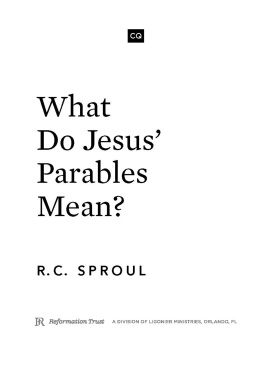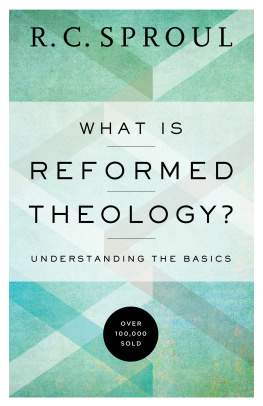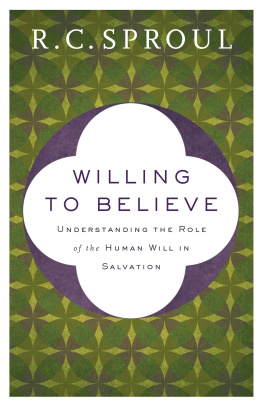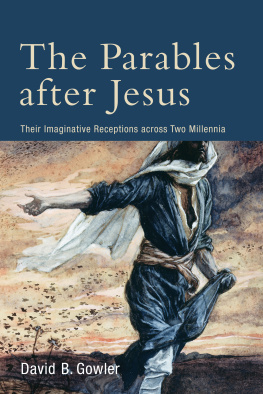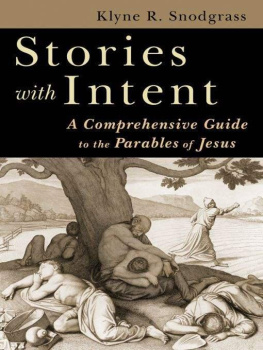Sproul - What Do Jesus Parables Mean?
Here you can read online Sproul - What Do Jesus Parables Mean? full text of the book (entire story) in english for free. Download pdf and epub, get meaning, cover and reviews about this ebook. year: 2019, publisher: CQ;Ligonier Ministries, genre: Religion. Description of the work, (preface) as well as reviews are available. Best literature library LitArk.com created for fans of good reading and offers a wide selection of genres:
Romance novel
Science fiction
Adventure
Detective
Science
History
Home and family
Prose
Art
Politics
Computer
Non-fiction
Religion
Business
Children
Humor
Choose a favorite category and find really read worthwhile books. Enjoy immersion in the world of imagination, feel the emotions of the characters or learn something new for yourself, make an fascinating discovery.
What Do Jesus Parables Mean?: summary, description and annotation
We offer to read an annotation, description, summary or preface (depends on what the author of the book "What Do Jesus Parables Mean?" wrote himself). If you haven't found the necessary information about the book — write in the comments, we will try to find it.
What Do Jesus Parables Mean? — read online for free the complete book (whole text) full work
Below is the text of the book, divided by pages. System saving the place of the last page read, allows you to conveniently read the book "What Do Jesus Parables Mean?" online for free, without having to search again every time where you left off. Put a bookmark, and you can go to the page where you finished reading at any time.
Font size:
Interval:
Bookmark:
Who Is Jesus?
Can I Trust the Bible?
Does Prayer Change Things?
Can I Know Gods Will?
How Should I Live in This World?
What Does It Mean to Be Born Again?
Can I Be Sure Im Saved?
What Is Faith?
What Can I Do with My Guilt?
What Is the Trinity?
TO BROWSE THE REST OF THE SERIES,
PLEASE VISIT: REFORMATIONTRUST.COM/CQ
What Do Jesus Parables Mean?
2017 by R.C. Sproul
Published by Reformation Trust Publishing
A division of Ligonier Ministries
421 Ligonier Court, Sanford, FL 32771
Ligonier.orgReformationTrust.com
Printed in China
RR Donnelley
0001018
First edition, second printing
ISBN 978-1-64289-063-1 (Paperback)
ISBN 978-1-64289-091-4 (ePub)
ISBN 978-1-64289-119-5 (Kindle)
All rights reserved. No part of this publication may be reproduced, stored in a retrieval system, or transmitted in any form or by any meanselectronic, mechanical, photocopy, recording, or otherwisewithout the prior written permission of the publisher, Reformation Trust Publishing. The only exception is brief quotations in published reviews.
Cover design: Ligonier Creative
Interior typeset: Katherine Lloyd, The DESK
All Scripture quotations are from the ESV Bible (The Holy Bible, English Standard Version), copyright 2001 by Crossway, a publishing ministry of Good News Publishers. Used by permission. All rights reserved.
Library of Congress Cataloging-in-Publication Data
Names: Sproul, R.C. (Robert Charles), 1939-2017 author.
Title: What do Jesus Parables mean? / by R.C. Sproul.
Description: Orlando, FL: Reformation Trust Publishing, 2017. Series: Crucial questions; No. 28
Identifiers: LCCN 2017027610 ISBN 9781567698398
Subjects: LCSH: Jesus Christ--Parables.
Classification: LCC BT375.3.S67 2017 DDC 226.8/06--dc23
LC record available at https://lccn.loc.gov/2017027610
This digital document has been produced by Nord Compo.
O ur Lord Jesus Christ was the greatest teacher who ever walked on the face of the earth. Not only was He the very incarnation of truthand so the content of His teaching was impeccable and of divine originbut He was also a master pedagogue. That is, His style of teaching was extraordinary.
His contemporaries said of Him, No one ever spoke like this man! (John 7:46). Some even said that He spoke as One who had authority, and not like the scribes and the Pharisees. Jesus teaching was not frivolous. It wasnt superficial. Everything He said had substance to it. Everything He said carried the very weight of His own authority. Jesus uniquely taught from the standpoint of the authority of God Himself. He said, For I have not spoken on my own authority, but the Father who sent me has himself given me a commandmentwhat to say and what to speak (12:49).
In His unique proclamation of truth with authority, Jesus is perhaps most noted for His use of parables. Of course, Jesus did not invent the idea of the parable. The Pharisees and rabbis of that time had a tradition of using parables, but their use of parable was different. The Pharisees used parables to explain or illustrate the meaning of the Mosaic law. Jesus used them to give new revelation.
Interestingly, you wont find a parable anywhere in the New Testament outside of the Gospels. And parables are also infrequent in the Old Testament. Perhaps the most famous parable of the Old Testament is the one delivered by the prophet Nathan to David after Davids sin with Bathsheba (2 Sam. 12:115). Nathan told the story of a rich man who had many sheep, but he took one little lamb from a poor man, who loved this one lamb dearly. When David heard that story, he was outraged and said, As the Lord lives, the man who has done this deserves to die, and he shall restore the lamb fourfold, because he did this thing, and because he had no pity. David didnt understand until Nathan clearly said, You are the man! (vv. 57).
In this parable, Nathan came to David with judgment. He came in a moment of crisis. And this is one of the ways in which parables function so richly in the New Testament.
The very word parable comes from two Greek words. Para-is a prefix that refers to something that is alongside something else. For instance, paralegals work alongside lawyers as helpers. And ball means to throw or to hurl. So parable means something that is thrown alongside of something else. In order to illustrate a truth He is teaching, Jesus throws a parable alongside of it.
It has been said of preachers that the most important part of their proclamation is illustration. We use illustrations to simplify, to clarify, to heighten peoples ability to understand what we are saying. But when Jesus uses parables to illustrate a point, there is another, somewhat mysterious, element, which sometimes gives us pause. After Jesus preached the parable of the sower, He said, He who has ears, let him hear (Matt. 13:9). Why would He say that? Were almost certain that everyone who was present had two ears. But Jesus was talking about people who have an ability to hear, to understand, and to embrace the truth.
In the Greek language, theres hearing, and then theres obeying what you hear. Obeying what you hear means really hearing ita hyperhearing or superhearing. When Jesus says, He who has ears, let him hear, He understands that some people might audibly hear His teaching, but it will not pierce their understanding or their hearts. So Jesus makes a distinction between those who hear and those who dont hear.
Once when Jesus was alone with the Twelve, they asked Him about a parable. He told them, To you has been given the secret of the kingdom of God, but for those outside everything is in parables, so that they may indeed see but not perceive, and may indeed hear but not understand, lest they should turn and be forgiven (Mark 4:1112).
Jesus explained that for those who have ears to hear, the parable provides a deeper understanding of Jesus teaching. But for those who dont have ears to hear, the parable is actually an instrument of concealment. The parable was not given simply to make everything clear to people; it was also given to obscure meaning to those who are outside, who are not given understanding. That sounds somewhat harsh. Jesus came not only to instruct and to help people understand the kingdom of God, He came also as a judgment on those who dont want to hear the truth.
Scripture says that Jesus came for a rising and a falling of many (Luke 2:34). Jesus said, I have come not to bring peace, but a sword. For I have come to set a man against his father, and a daughter against her mother, and a daughter-in-law against her mother-in-law (Matt. 10:3435). Hes the rock of stumbling, the stone of offense, but to those who love Him, He is the aroma of salvation. To those who oppose Him, Hes the grounds for their condemnation.
And we see all of this in His use of parables. He would take His disciples aside and say, To you has been given the secret of the kingdom of God (Mark 4:11).
We find many different themes when we read the parables. But one of the most common ones is the gospel of the kingdom of God. The term gospel is used in three ways in the Bible. One way is to describe a particular literary form, the Gospels, the books that tell us about Jesus, His life, and His ministry.
But the gospel that is defined and proclaimed by John the Baptist, and then by Jesus, is the good news of the kingdom of God; this is the second way that the word is used in the New Testament. The third way can be seen in Pauls Epistles. There, Paul talks about the gospel of our Lord Jesus Christ; the content of that gospel is JesusHis person and His work. So there is a transition in the meaning of the word
Font size:
Interval:
Bookmark:
Similar books «What Do Jesus Parables Mean?»
Look at similar books to What Do Jesus Parables Mean?. We have selected literature similar in name and meaning in the hope of providing readers with more options to find new, interesting, not yet read works.
Discussion, reviews of the book What Do Jesus Parables Mean? and just readers' own opinions. Leave your comments, write what you think about the work, its meaning or the main characters. Specify what exactly you liked and what you didn't like, and why you think so.

